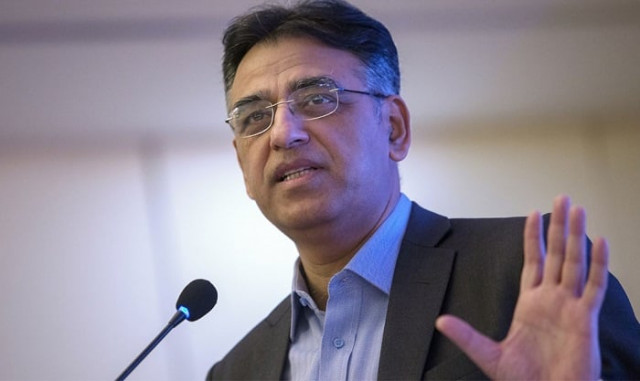Economy created 5.54m new jobs since 2018
Planning Minister Asad Umar unveils results of Labour Force Survey 2021

Planning Minister Asad Umar on Friday said the country’s external sector situation was difficult and it would be challenging for any new finance minister to handle it.
However, he added that the situation was not as “bad” as it was three and a half years ago.
“Irrespective of the circumstances, it is a difficult situation. If we win the next elections and form the government, it will be a difficult task for [Finance Minister] Shaukat Tarin to handle the external sector situation,” said Umar while responding to a question at a news conference.
The minister officially unveiled the results of the Labour Force Survey 2021, which showed that the economy generated 5.54 million new jobs since June 2018 -- significantly better than the performance of the last two political regimes.
To a question as to whether or not the PTI was also leaving behind landmines in the shape of high current account deficit with low foreign exchange reserves, Umar said: “The external sector situation is difficult but not as dangerous as it was in 2018.”
The minister added that just before the 2018 elections, the current account deficit was widening and during the three months’ period before the PTI formed the government, it was increasing at a rate of over $2 billion a month.
In the year ending June 2018, the current account deficit had been booked at $19 billion.
During the eight months of the current fiscal year, the deficit has already widened over $12 billion and estimates suggest that it will be around the same level left behind by the PTI.
However, Umar claimed that the current account deficit had remained high, but it was also on a declining path. “External factors like the commodity prices crisis did not exist during the PML-N’s time and all the damage done to the economy was the result of the then government’s own decisions.”
He also maintained that the net international reserves held by the central bank were better today than the level left behind by the PML-N.
In the shorter term, Pakistan may not have an option but to stay in the International Monetary Fund {IMF) programme to secure huge external financing that it needs to remain afloat, according to various assessments.
Read: Employment boom in last 3 years
Pakistan and IMF programme has again been derailed for the third time since it began in July 2019.
The talks stalled because of the “imprudent” fiscal policies of the government.
While sharing the findings of the labour force survey, Umar claimed that because of the policies of the government, the economy created 5.5 million jobs during the past three years -- on an average 1.84 million jobs a year.
In absolute terms, during the past three years, about 2.5 million jobs were created in the industrial sector in comparison with 2.1 million created during the five-year PML-N tenure.
Another 1.4 million jobs were created in the agricultural sector and 1.7 million in the services sector.
During the PML-N’s tenure, around 4.3 million jobs were created in the services sector.
The planning minister claimed that the reasons behind better performance by the PTI was that Prime Minister Imran Khan targeted the agricultural and construction sectors, which were job intensive.
He claimed that during the past three years, about 1.4 million jobs were created in the farm sector. This was in comparison with 720,000 jobs that were lost in this important sector of the economy.
Umar claimed that the jobs in the industrial sector increased at an annual rate of 62%.
Read: ‘Kamyab Jawan programme will create jobs, empower youth’
The survey results showed that the national unemployment rate stood at 6.3% at the end of the last fiscal year, which is better than the preceding year but higher than 5.8% recorded at the end of the PML-N’s tenure.
The findings showed that the number of employed people increased to 67.3 million by June 2021 -- up from 61.7 million at the end of the PML-N’s tenure.
The figure is exclusive of the labour force in areas of erstwhile Federally Administered Tribal Areas (FATA) because in 2018, no survey had been conducted there.
The unemployment rate was the lowest in Sindh at 3.9% that is ruled by the PPP, but highest in Khyber-Pakhtunkhwa at 8.8%, followed by 6.8% in Punjab -- the two provinces governed by the ruling party.
PM Imran had promised to create 10 million jobs during his government’s tenure. The creation of 5.5 million jobs suggests that the economy might generate a total of nine million employment opportunities by 2023 at the current rate.
The minister regretted that the political turmoil might cause a slow economic growth rate in this fiscal year that otherwise was projected to increase over 5%.
“This would have been the second consecutive year when Pakistan’s economic growth rate might have crossed 5%,” he added.



















COMMENTS
Comments are moderated and generally will be posted if they are on-topic and not abusive.
For more information, please see our Comments FAQ